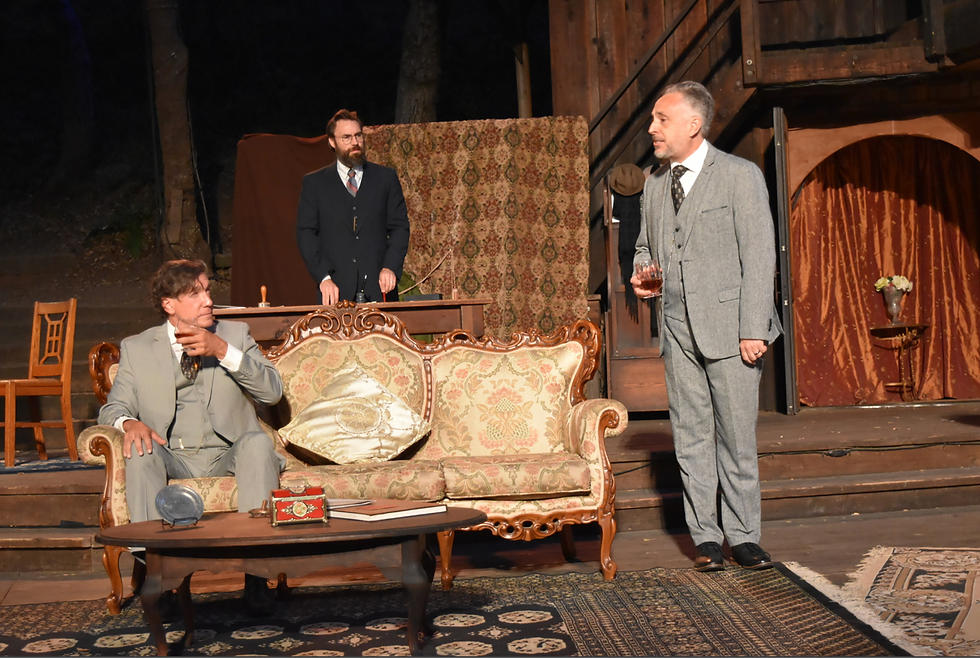Review: A Relevant Message in 'Strife' at Theatricum Botanicum
- Mayank Keshaviah

- Aug 29, 2025
- 4 min read
Updated: Aug 30, 2025

Shakespeare’s plays continue to be remounted and adapted, decade after decade, century after century because the frailties, passions, jealousies, and fears expressed by the human characters in them don’t change much over time. But a five-act Shakespeare play is often trimmed down to two or three acts, and in the case of filmic adaptations, the text may be radically altered to resonate with modern sensibilities.
While the former is laudable rationale for Theatricum’s revival of John Galsworthy’s 1909 play “Strife,” the latter approach might have helped the script land better with a 2025 audience. To be sure, the remount has been adapted, such as relocating the setting from the Trenartha Tin Plate Works (on the border of England and Wales) to the Homestead Steel Factory in 1890s Pennsylvania. But an editor’s pen might have also tightened the long-winded, early-1900s prose to create a more compelling tale.

The story opens in the middle of winter at the home of Francis Underwood (Sam Cowan), manager of the Pittsburg steel plant. He and the board of directors are deep in debate because a strike has broken out among the workers. But the chairman and founder of the company, a surly John Anthony (Franc Ross), remains steadfast in his opposition to any sort of compromise.
Dressed in three-piece suits and sipping whiskey from crystal glassware, Frederic Wilder (Adam Mondschein) and William Scantlebury (Tim Halligan) complain they “shall boil” if they don’t get a screen for the too-hot fireplace. Wilder also worries the strike will prevent him from taking his wife to Spain. Outside, the workers and their families subsist on scraps while scrounging coal for the stoves that heat their rickety shacks.

A starker contrast between the haves and have-nots could not have been drawn. But complicating the standard “labor vs. management” conflict is union boss Simon Harness (Brian Wallace), who seems to play both sides. Defying Harness is probably the most captivating character in the ample cast, David Roberts (a bold and charismatic Gerald C. Rivers), the de facto spokesman of the Workmen’s Committee and a principled firebrand who speaks truth to power.
A clearer picture of the effects of the strike on the workers’ families emerges when we meet the workers’ wives, who wear layers of coats as they huddle around a single stove and sip tea to keep warm and barely nourished. Into this sad scene swoops Enid Underwood (Emily Bridges), daughter of John Anthony and wife of the factory manager. She calls on the wife of David Roberts, Annie (Earnestine Phillips), who admirably maintains a principled solidarity with the workers, even at the expense of her own health. Enid, though sympathetic to Annie’s plight and that of the workers, nonetheless comes off as an intrusive “white savior.”

As the strike drags on, irresistible force meets immovable object in the tug-of-war between David Roberts and John Anthony: neither man will budge an inch, and both soon face the consequences of their obstinacy. But let me not imply a false equivalence. John Anthony is a combative, Trumpian curmudgeon who rules with an iron fist, constantly calling the younger generation “soft” and “weak” while longing for “the good old days.” There is little sympathetic or redeeming about him.
David Roberts hurls fiery insults at “Capital,” deeming it a “white-faced, stony-hearted monster,” and his insistence on fighting the good fight for the benefit of future generations does have a major downside. But his tragic loss is one we can sympathize with, despite his hand in allowing it to happen.

While the story brings up timely issues, the text is very “talky” and somewhat stagnant, not unusual for works from the early 1900s. At the same time, “issue plays” that feature long debates without much action can be captivating, as with “Inherit the Wind” or “New Jerusalem,” both of which feature long philosophical diatribes, but feel more urgent and active.
Mother and daughter, Ellen and Willow Geer, co-direct the piece. Their casting choices for David Roberts and his wife amplify the workers’ struggle, as it provides an apt racial undertone to such historically poor treatment of the laboring class. At the same time, their choice of blocking sometimes lacks energy, and physically violent moments could have used a fight choreographer to make the fisticuffs feel more authentic.

Standouts amongst the sizeable cast are Mondschein and especially Rivers, who commands the stage and brings a captivating energy to the long monologues. Marshall McDaniel’s old-timey soundtrack, Alex Penner’s period properties, and the sylvan setting of the theatre itself nicely transport us to late nineteenth-century Pittsburgh. The “unpolished” wooden construction of the Botanicum’s amphitheater also creates an apt set for the time period.
So even during the slower moments in the script, it was comforting to be in nature and enjoy the music of the crepuscular creatures that populate a Topanga evening. It’s also heartening that the Geers continue the activist tradition that has been a part of their family’s theatre since its founding. We should all be grateful the Botanicum was able to survive the recent Palisades Fire, as it remains a special place for Angelenos to escape the hustle and bustle of the city for an evening of meaningful theatre.
“Strife” continues through Oct. 4 at Will Geer Theatricum Botanicum, 1419 N. Topanga Canyon Blvd., Topanga, with shows Fridays, Saturdays and Sundays in repertory, but showtimes vary by week. For full schedule, tickets and other information, visit Theatricum.com or call the box office at (310) 455-3723. Run time is 2 hours, including one 15-minute intermission.



Comments